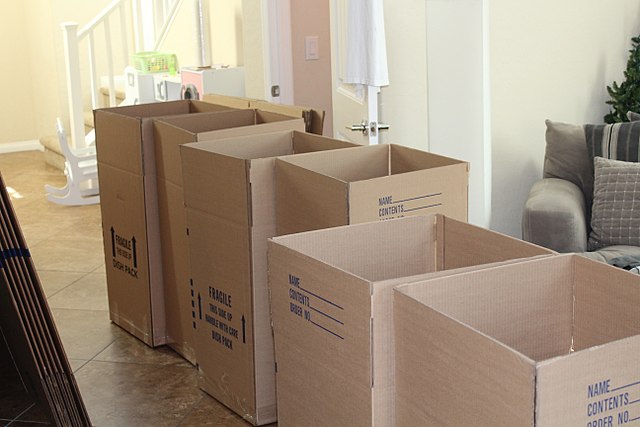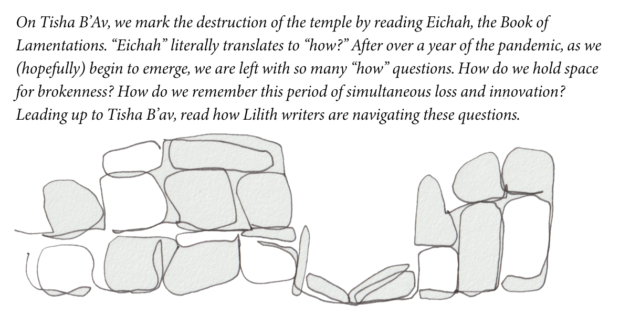
Grief, Weddings; Open First

“Someone I loved once gave me a box full of darkness.
It took me years to understand that this too, was a gift.” — Mary Oliver
Despite the label’s demand, the brown U-Haul box remained taped up, stacked up, and out of sight. After years ensconced in our rental apartment that became a true haven during the pandemic, our landlords were selling and we had to leave. Our first home together was now packed up, loaded up, and off we went. The new home was only one mile away, but it felt like the diaspora. Unpacking was slow and despite each of us being people of the book, our books remained ensconced in a wall of boxes.
And then suddenly on our way out of town, I felt a yearning. I could not leave the house until I’d opened that box, hoping to find within a particular book my dear friend Sara assured was a gift to the heart, which I had purchased in the pandemic seemingly ages ago, then left unread at my bedside, then packed away in a moving box labeled: “Death, Weddings; Open First.” And I simply could not leave without finding it.
This was a July 4th jaunt out of town after months of personal tumult—the walls of life as we knew it falling down around us: shifted wedding plans, a painful and drawn-out conclusion of a beloved job, family health issues, fertility treatments, the move, unpacking… a collective uprooting that still weighed heavily on our hearts. On a weekend devoted to celebrating our nation’s independence, perhaps we hoped fireworks might muffle the wailing cries of global grief, national bereavement, communal sorrow, and individual suffering from months of isolation, loss and fear. The fissures of our society truly revealed, the heat of climate change boiling, a racial justice reckoning, a rise in antisemitism, and so, so much loneliness—we sought respite from the reverberations of collective catastrophe.
So I needed that book because freedom means to read—unfettered— at an Airbnb in the Berkshires for as long as you want. I ran inside, cut the heavy-duty packing tape with scissors and… it wasn’t there. I panicked, ran to another wall of books and sure enough, in this fortification of book boxes each labeled to describe the books within- and maybe my inner life—was a second box, similarly labeled “Grief, Weddings; Open First.”
Then I tucked “The Way of Solomon” by Rami Shapiro in my bag, we buckled our rescue dog Joey in the back seat and drove off. And for a moment, this past year, with its pain and joy, the packing, the unpacking, the resettling, the recreating home—and the heaviest question of “What do we do when things fall apart?”—was in the rearview mirror as the waters of Stockbridge Bowl beckoned.
**
What do we do when things fall apart? I imagine my friend Matt, whose final moments with his dying mother were on Facetime, as she made the shape of a heart with her hands and left this world with love. I imagine the young adults I served in that beloved job, whose goals and dreams were delayed, who sought partners or professional growth, but instead sat for days on end in their homes, with only the nurture of Netflix to accompany the silence. I think of my parents rejoicing with bride and groom on Zoom because it wasn’t safe to travel. I think of the new parents who labored alone in the hospital and whose family waited months to meet new babies. I think of the students and teachers, the essential workers and the full-time parents, the elderly and the toddlers – most of whom languished as the walls of society came crumbling down around us, and we humans became a danger to one another. So, what do we do when things fall apart? How do we recover? And will we ever recover?
The Book of Lamentations, classically read on the observance of Tisha B’av, asks these same questions. “Alas! How? Eicha…” the author weeps, lamenting the bitterness and desolation in the wake of destruction of the Temple in Jerusalem. The loss of the Temple in Jerusalem was a destruction of the “world as we knew it” not once, but two times. Tremendous grief ensued, still rooted in the hearts of many today, as our ancestors sought to rebuild their lives. But as history and hindsight remind, these periods of destruction led to tremendous innovation. It began first with grieving, longing, and wailing; and in time (well, centuries) this tragedy led to a process of conversation and storytelling. Whether exiled by the waters of Babylon or remaining in the Land of Israel, academies of scholarship began to write down their stories, conversations, questions and ideas… starting with their grief as cried out in Lamentations. And eventually, over centuries, the literary innovation of the Talmud, the documentation of oral Judaism, emerged.
Even though our central place of gathering was now gone, our ideas, our stories, our thoughts, our questions – remained.
So, too, living in the diaspora without a holy Jerusalem Temple to bring sacrificial offerings, Rabbinic Judaism emerged in the form of prayer, practice, and obligation one to another. We learned we couldn’t be fully Jewish alone – rather we need a quorum of ten to bring holiness and wholeness into our midst. We learned how to be Jewish in a world that was not, exploring our relationship to Otherness, to difference and diversity. And we leaned into being those people of the book. Even though our central place of gathering was now gone, our ideas, our stories, our thoughts, our questions – remained. The world as we knew it was no longer, and many worlds, many lives ended, but perseverance, creativity and growth ensued.
So what do we do when things fall apart? And how do we recover? Will we ever recover? I don’t know. I hope we do, but I have no idea how long it will take. But I think it starts with crying.
We need to cry. And then we need to cry some more, calling out ancient words of grief from Lamentations: “Eicha!” Alas! Or the words from Ecclesiastes, “Hevel Hevalim: All is futile!” As we cry, we will tell stories of remembrance – to reencounter the traumatic experience and to lift up the memories of lives lost. We will sing songs, or find poetry, or art, or movement, or silence – to express our heart’s inner longings, our grief, but also joy. Perhaps in time we will have a day devoted solely to remembering the pandemic and each and every individual who died in it. Just as we return each year to days of sorrow such as Tisha B’av, we will always carry our grief with us. But in time it will transform.
Amidst the fall of the second temple in Jerusalem in 70 C.E., we find the powerful story of Yochanan ben Zakkai. He escaped Jerusalem in a coffin en route to establish a new center for Jewish life in Yavneh, the root word for which means “to build.” Even in the wake of great hurban, tragedy and disaster, he and our ancestors sought ways to build and rebuild.
Sometimes the walls of life come falling down around us: but in time we pick up the pieces to rebuild. We pack and unpack the boxes of our lives, casting away what no longer serves us, while keeping with us enduring learnings of the story of a resilient people. As exhibited in both the tiniest fractals of creation and the greatest moments of modern innovation, from death eventually comes life, mourning turns to dancing over and over again until wholeness and peace reign.
That weekend, it rained on and off in the Berkshires. We saw friends, enjoyed meals, celebrated Shabbat and our nation’s independence at Tanglewood. Although I’m sure it’s worth the read, I never even pulled that book out of my bag but am grateful for the comfort it brought. The wall of boxes that reminds us of all the joys and sorrows, of the laughter and so many tears of this past year are slowly finding their new home. “Grief, Weddings; Open First”—such is the art of living throughout the ages for the people of the book.
Rabbi Jen Gubitz is a rabbi in Boston, an Indiana Hoosier at heart, and the co-host of the OMfG Podcast: Jewish Wisdom for Unprecedented Times.



